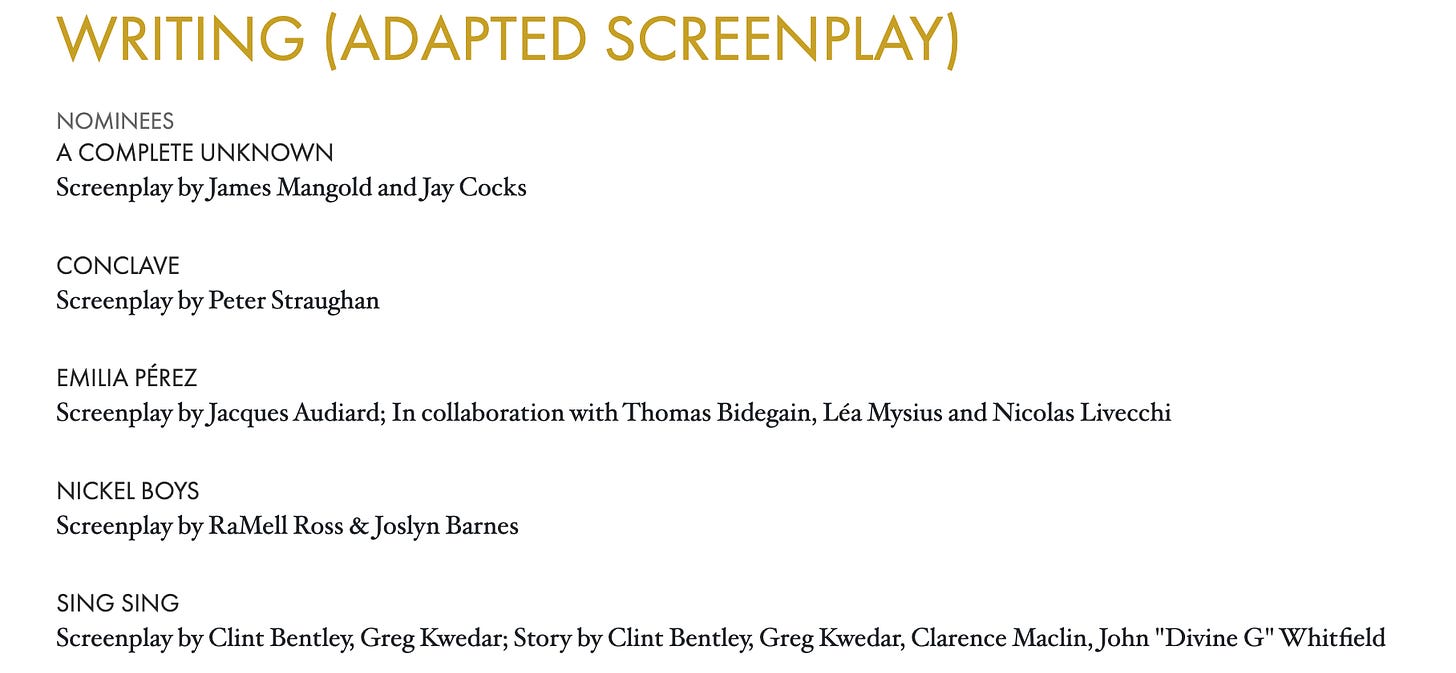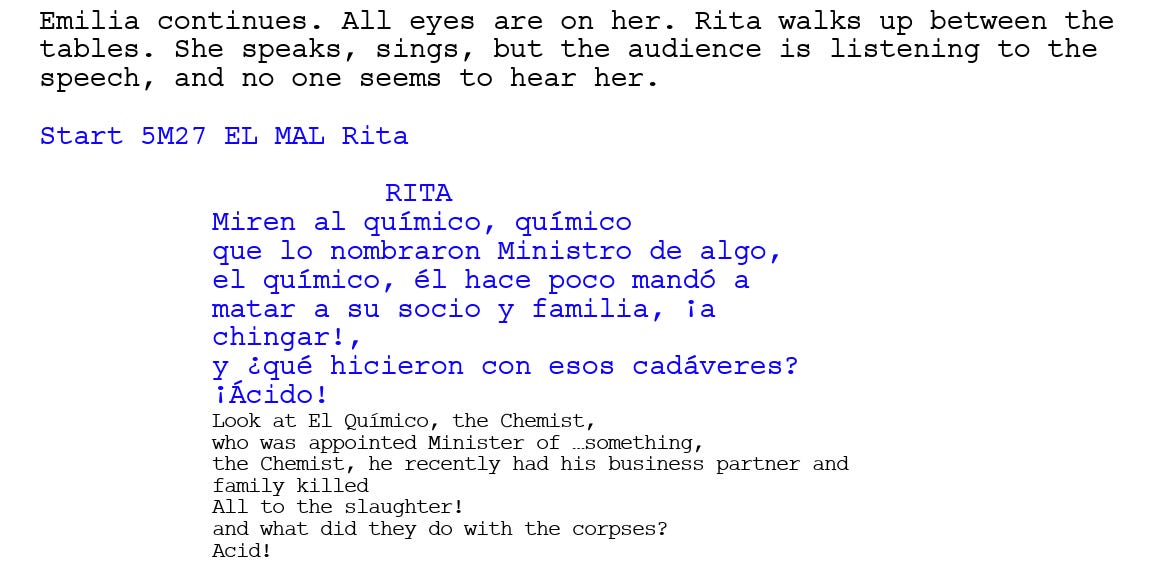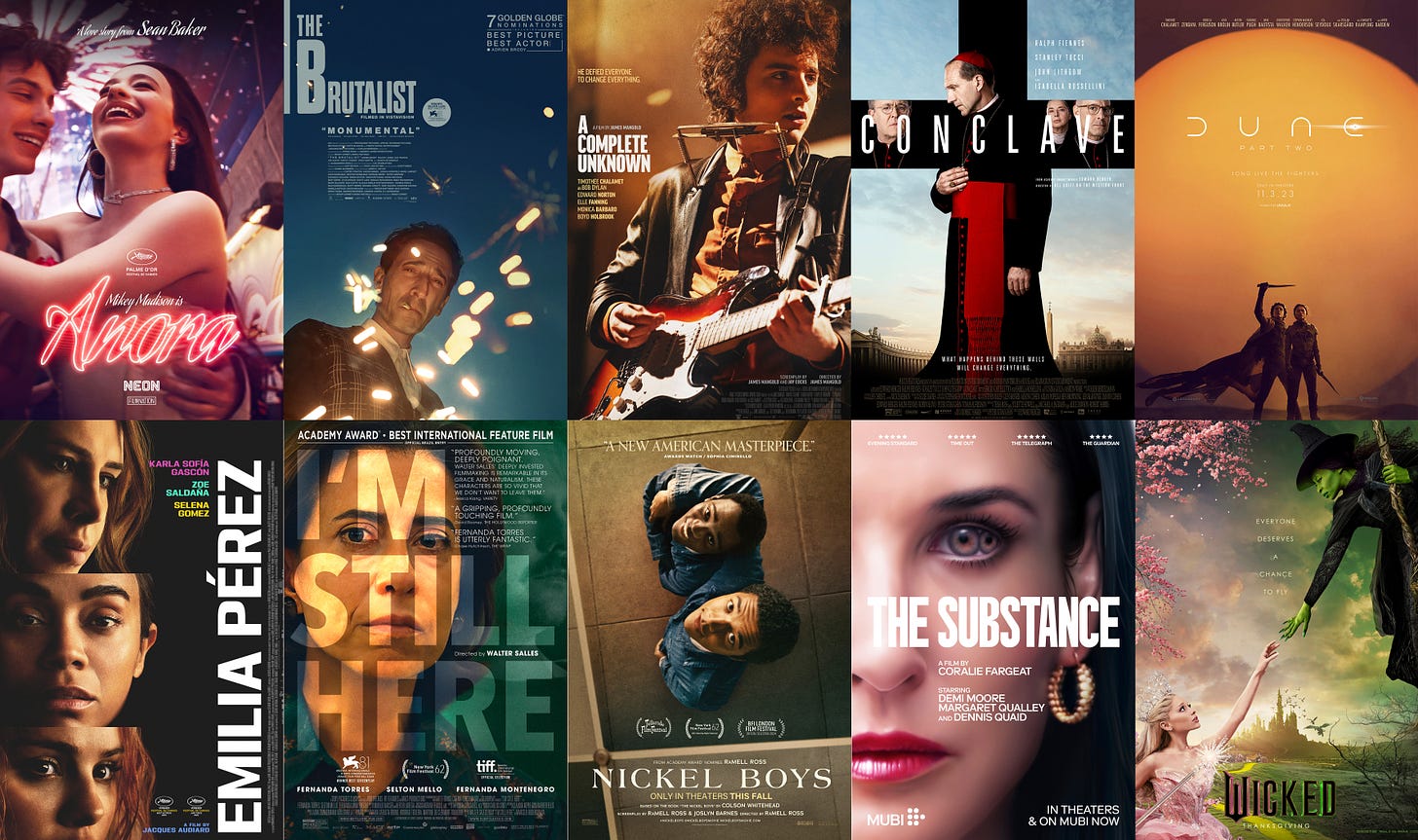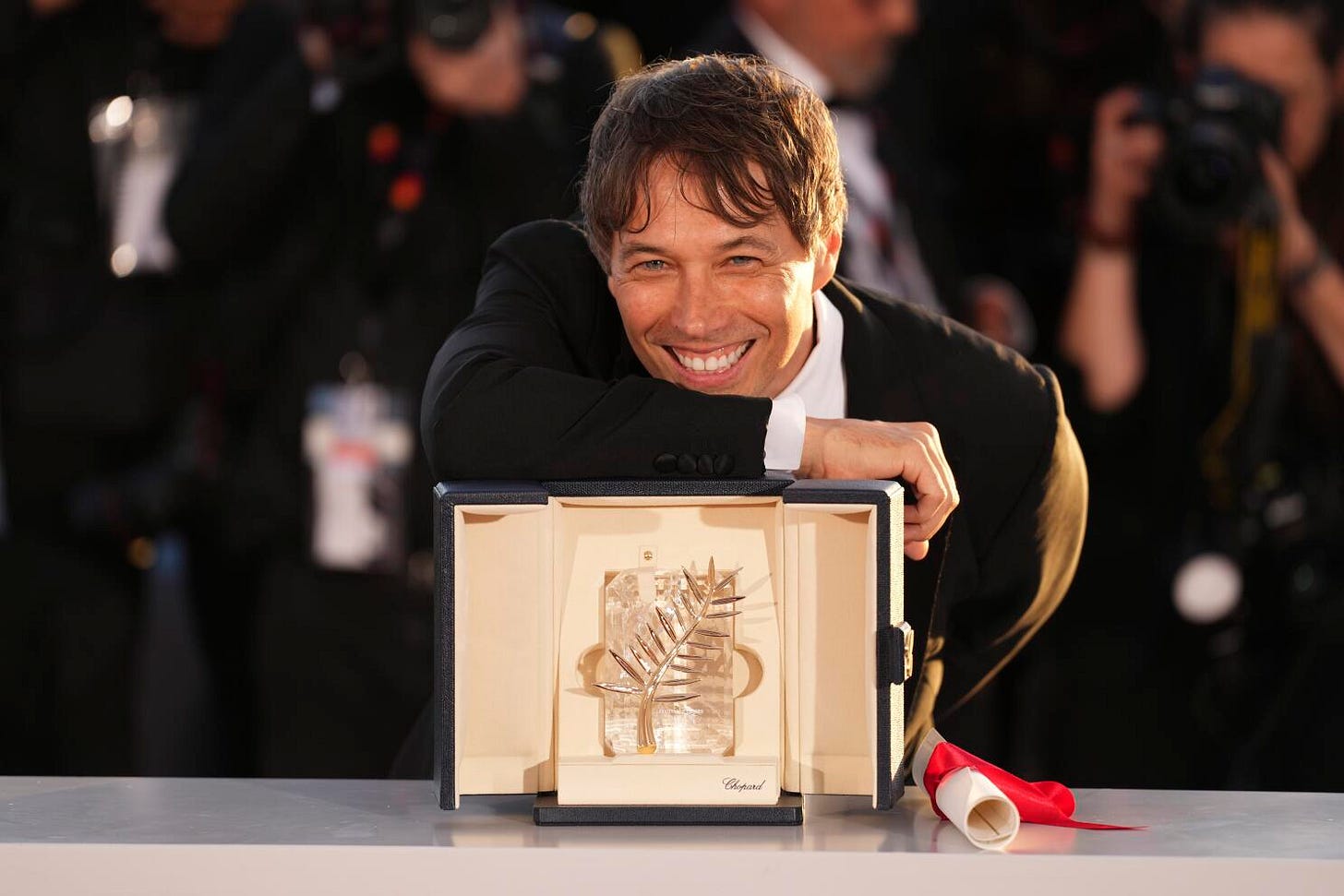What I’m looking forward to most at the Oscars on Sunday is not any one particular award being presented, but watching global icon Lisa of Blackpink perform the James Bond tribute. If this is the future Amazon has envisioned, I’m here for it (I’m not, but I will make an exception this one time).
Before Sunday’s ceremony though, I thought I’d do a little personal ranking for you of the nominated screenplays. Let me start off by saying that all screenplays are a product of years of hard work and tedium and no matter what happens with the final film, the starting document is already a huge achievement in and of itself.
Best Adapted Screenplay Nominees:
5. Emilia Perez by Jacques Audiard in collaboration with Thomas Bidegain, Lea Mysius, and Nicolas Livecchi
I admit that part of the reason why Emilia Perez is ranked so low is because of my own poor Spanish language skills. The way the script is formatted shows the Spanish dialogue on top with the English translation in smaller font on bottom. It’s just a really difficult read and strenuous to parse through. Additionally, without the musical element, the script is pretty straightforward and mildly soapy.
4. A Complete Unknown by James Mangold and Jay Cocks
Enough has been written about the deficiencies of the plotting of this movie — the contrived third act stakes, the lack of explanation for Bob’s seemingly inexplicable rise to stardom — but what I was most curious about was James Mangold’s recreation of a scene he used in 2005’s Walk the Line.
I have a soft spot in my heart for Walk the Line, which I saw when I was 12-years old. I thought it was just gosh darn wonderful (and was probably my first real exposure to addiction depicted on screen). Late in the movie, Johnny Cash and June Carter sing “It Ain’t Me Babe” onstage, stirring feelings of jealousy in Vivian, Johnny’s wife. In A Complete Unknown, Mangold pays homage to that scene by having Bob Dylan and Joan Baez sing that same song, much to the consternation of Bob’s old flame Sylvie.
How did those two scenes look on the page almost 20 years apart? Here’s the original from Walk the Line:
And here’s the version in A Complete Unknown:
Similar in temperament and intention, and with Mangold’s characteristic writing style. Overall, A Complete Unknown is a perfectly serviceable document for a serviceable, but unexceptional, biopic.
3. Conclave by Peter Straughan
I mentioned my thoughts on Conclave in a previous post and how it was very much a writer’s script. I really enjoyed how much interiority Straughan gives us in the action descriptions in the script, and I’m sure it was enormously helpful to the actors in digging into the intentions of their characters. The script reads wonderfully, and there’s a reason why it’s the clear frontrunner to take the Oscar in this category on Sunday.
2. Nickel Boys by RaMell Ross & Joslyn Barnes
Ross & Barnes put together a gorgeous literary document — the first person POV plays better than it reads, but I thought the script itself was a wonderful ode to the source material. An artistic interpretation of a novel that Colson Whitehead laid out so beautifully, and in a way that wasn’t gratuitous about the violence.
The final moments of the film are intercut with a series of archival footage shots over the progress (or lack thereof) of society in the ensuing decades. I was fascinated to see that Ross & Barnes wrote out every piece of archival footage that would end up getting used in the movie. Here’s just a brief snapshot of the meticulously planned out final montage:
1. Sing Sing by Clint Bentley, Greg Kwedar
Sing Sing follows a group of men at the infamous New York correctional facility who prepare for a theater performance as part of the Rehabilitation Through the Arts program. Incredibly, one of the men who lived the experience, Clarence Maclin, both contributed to the story and starred in the movie.
When I watched the film, I struggled with the screenwriting — I felt like the movie lacked structure and fought to cohere; it seemed to be building towards something but without any urgency. But perhaps the meandering nature of the movie was intentional in showing us just how endless the days in a prison can feel.
When I opened the screenplay, I was delighted to see how wonderfully written it was, how much interiority it gave the actors to work with. AND! Best of all, it was a blessedly short 77 pages. For that alone, someone give it the Oscar. Here is a snapshot from the final scene of the script:
Who Will Win: Conclave
Who Should Win: Sing Sing
Best Original Screenplay Nominees:
5. The Brutalist, by Brady Corbet, Mona Fastvold
Besides the fact that I thought The Brutalist was overlong and doesn’t in any way justify its length (especially with that atrocious ending), one of my least favorite things about the screenplay document is how many BLOCKS of text it’s filled with. Monologue after monologue. From a pure reading perspective, it’s a slog to get through.

4. A Real Pain, by Jesse Eisenberg
Jesse Eisenberg’s script is quippy, fast, and fun. And it’s a beautiful 100 pages flat (contrast this with The Brutalist’s brutal 131-page count). I enjoyed the way Eisenberg wrote his characters, but nevertheless found Kieran Culkin’s Benji largely off-putting. Without the performance, Benji comes off as a real asshole on the page. Or, shall I say, a real pain? Case in point:
3. The Substance, by Coralie Fargeat
I’ve also previously written about The Substance script and how much fun it is as a read. Fargeat is French and I do think there are some sentences that come off as clunky in English. At 145 pages, this one might be the longest script out of all the nominees, but I find it easier to get through than The Brutalist because it’s far more riveting. Here’s one scene that I think reads as hilarious on the page:
Ultimately, The Substance isn’t any higher up in the rankings because it has about the subtlety of a Monstroelisasue.
2. September 5, by Moritz Binder, Tim Fehlbaum; Co-Written by Alex David
This movie followed the unfolding story of Israeli Olympic athletes who were taken hostage at the 1972 Munich Olympics from the confines of the ABC newsroom. I love a good journalism movie, and this is so tightly written as an intense, mostly one-location thriller. The screenwriters do a great job raising tension, setting stakes, and asking questions about ethics in journalism.
It’s a very written script, in that you can feel the screenwriters hands at play, but it worked effectively for me. Given global events, the timing of this movie was not ideal, and it didn’t receive much attention in the awards cycle.
1. Anora, by Sean Baker
In a previous post, I mentioned how clinical Sean Baker could be as a writer, and how much he is writing for himself to direct (there are specific numbers and shots he calls out on the page that will clearly be useful to him later in production).
While it’s not the most literary screenplay, and it’s sparse in its action descriptions, Anora is buoyed by the strength of Baker’s dialogue writing, and how realistic he’s able to make these characters sound. It also doesn’t hurt that it’s my favorite of the Best Picture nominees of the year.
WILL WIN: Anora
COULD WIN: A Real Pain
SHOULD HAVE BEEN HERE: Challengers, by Justin Kuritzkes
And in case you’re curious …
Here are my personal rankings for Best Picture:
10. The Brutalist — overlong and does not justify its length. Although it was visually stunning on a very contracted budget, visually stunning feels like the bare minimum a film needs to pull off these days. The themes explored — the immigrant and the American Dream — have been explored before with far more … brevity.
9. A Complete Unknown — My complaint with the movie was that I went into it knowing next to nothing about Bob Dylan … and I walked out knowing next to nothing about the man, except for the fact that he’s an asshole towards woman. Felt uncompelled by the subject matter, impressive as the sound design was.
8. Emilia Perez — Karla’s controversy aside, I still respect that this movie was a swing for the fences, knowing how hard it is for any movie to get made in this market. But given the strength of the field, this film felt overly simplistic in its depiction of gender politics and Mexican cartels.
7. I’m Still Here — an important film about heavy subject matter (Brazil’s dictatorship in the 1970s and their penchant for “disappearing” aka murdering people). I’m glad I went to see this and learned a lot about a period I knew relatively little about. I couldn’t help comparing this film to Roma and feeling that Roma had much more story engine to it — after a pivotal turning point in I’m Still Here, the movie drags.
6. Conclave — a smart, silly romp through Catholicism. The girls are sipping the tea and printing out pages of the Burn Book to shame each other. This was very enjoyable and straightforward, but it’s not the best movie of the year. Would be wild if it managed to Conclave its way to a win, which some people have been predicting.
5. Dune: Part Two — no one is doing it like Denis Villeneuve these days. I know what Denis means when he says he wants to make films with no dialogue — his visuals are so sweeping and stunning, I just want to soak in them for hours. He, Christopher Nolan, and James Cameron are operating on a cinematic tier above the rest of us.
4. Wicked — I know there are a lot of flaws with this film, but Wicked was a very formative property in my childhood and this movie brought me so much nostalgic joy. Cynthia Erivo and Ariana Grade both gave terrific performances, and the finale rendition of “Defying Gravity” was as rousing as I hoped it would be. Jon M. Chu is staking his claim as a master of the popcorn blockbuster.
3. The Substance — another enormous swing for the fences that I’m stunned Coralie Fargeat was able to get financing for. Hats off to Fargeat for taking a simple premise to its most logical and extreme ends, getting entire theaters of people squirming and gasping in their seats. A tour de force of prosthetics work — I can’t wait for this movie to take the makeup and hairstyling Oscar on Sunday.
2. Nickel Boys — the more the Nickel Boys has sat with me, the more I love this adaptation of Colson Whitehead’s Pulitzer Prize-winning novel. I remember sobbing when I read the last page of the book (which ultimately is not adapted to screen). What an experimental approach to take to this movie — I wouldn’t have ever conceived of doing a first-person POV narrative, and RaMell Ross pulls this off so artistically and brilliantly. A movie that makes audiences think, and a pity that it isn’t getting more love.
1. Anora — Anora has been my frontrunner for a while and remains so. Sean Baker is able to make films that feel so fueled with humor, anxiety, and tension, while also making us empathetic towards humanity at large. The run-time is a bit long, but the ending is utterly devastating because it feels so real. I’ll be thinking of Ani pounding Igor’s chest while the sound of windshield wipers squeaks in the background for a long time.
And so, what were you favorite scripts and movies of the year, and who do you think will win on Sunday? Let me know in the comments below!























Oh wow! I didn’t realize Conclave was the favorite to win the category. I was hearing it was nickel boys. I guess we shall see! I guess I’ll have to check out the Sing Sing script now…
I’m a bit sad that I’m Still Not Here isn’t higher on your list. I was crying for much of the much movie, and I don’t easily weep when it comes to movies. We were the first to leave and everyone else in the theater was just sitting in their seats shell-shocked at the end of the movie. I didn’t really see any parallels between it and Roma but that’s an interesting comparison. To each their own